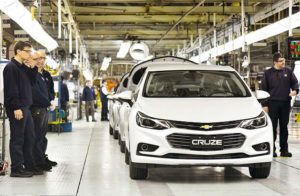General Motors explained to the US Commerce Department that broad tariffs such as the

kind the Trump administration is threatening to impose, could “lead to a smaller GM, a reduced presence at home and abroad for this iconic American Company, and risk is less-not more- U.S. jobs.” GM is the country’s largest automaker.
Back in May the Trump administration started an investigation to see if imported vehicles are a threat to U.S. national security. President Trump as many times stated that he would be happy to place a 20 percent import tariff on vehicles.
GM produces some of its cars overseas now for the U.S. market, including in Canada and Mexico. GM warned that tariffs could dampen sales and raise prices. Even if the company decided not to pass on their higher costs to consumers, this “could still lead to less investment, fewer jobs and lower wages for our employees. The carry-on effect of less investment and a smaller workforce could delay breakthrough technologies,” GM said.
The company employees about 110,000 people throughout the United States in 47 manufacturing plants. It purchases tens of billions of dollars’ worth of car parts from US suppliers annually. They have invested more than $22 billion in US manufacturing infrastructure since 2009.
The overbroad and steep application of import tariffs on our trading partners risks isolating U.S. businesses like GM from the global market that helps to preserve and grow our strength here at home,” GM said.
Also filing comments in opposition to the Tariffs was Toyota Motor Corp. They said that tariffs would, “threaten U.S. manufacturing, jobs, exports, and economic prosperity.”

